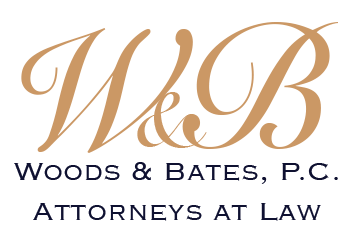When someone passes away, their property doesn’t just transfer on its own. Whether you’ve just lost someone or are trying to plan ahead, knowing how probate works can save time, stress, and confusion.
At Woods & Bates, P.C., we help people across the state understand what probate means—and how to prepare for it. Here’s what you need to know.
Probate in Plain Terms
Probate is the court process used to handle a person’s estate after they die. If there’s a will, it gets filed with the court. If there isn’t one, the court follows state law to decide who inherits. Either way, someone—called a personal representative—is appointed to manage the estate.
That person is responsible for:
- Gathering and reviewing assets
- Paying any debts or taxes
- Distributing what’s left to the right people
Does Every Estate Go Through Probate?
Not always. Probate is usually required if the person owned real estate in their name alone or had more than $100,000 in assets that weren’t held jointly or named a beneficiary. But if the estate is under $100,000 and there’s no real estate, a Small Estate Affidavit might be enough to handle things outside of court.
Why It Matters
Probate helps create order during a time that’s often emotional and uncertain. It gives the process structure, making sure the right people receive the right property—fairly and according to the law. It also protects family members by ensuring that outstanding debts are resolved properly before anything is passed on. And when disagreements arise over the will or who should receive what, probate gives the court a way to settle those questions clearly and openly. Without it, loved ones can be left unsure of what’s next.
Planning Ahead Can Help
No one wants their family to deal with extra stress after they’re gone. Planning now can make a big difference later. While probate can serve a helpful role, it also takes time and comes with court filings, fees, and public access to personal details. That’s why many people choose tools that allow certain assets to skip probate entirely. With options like trusts, payable-on-death accounts, and transfer-on-death deeds, it’s possible to pass property along faster, privately, and with less paperwork.
Let’s Talk About What Comes Next
Woods & Bates, P.C. offers guidance you can count on, along with virtual services to fit your schedule. Whether you’re managing a loved one’s estate or planning your own affairs, call 217-735-1234 to start the conversation.

